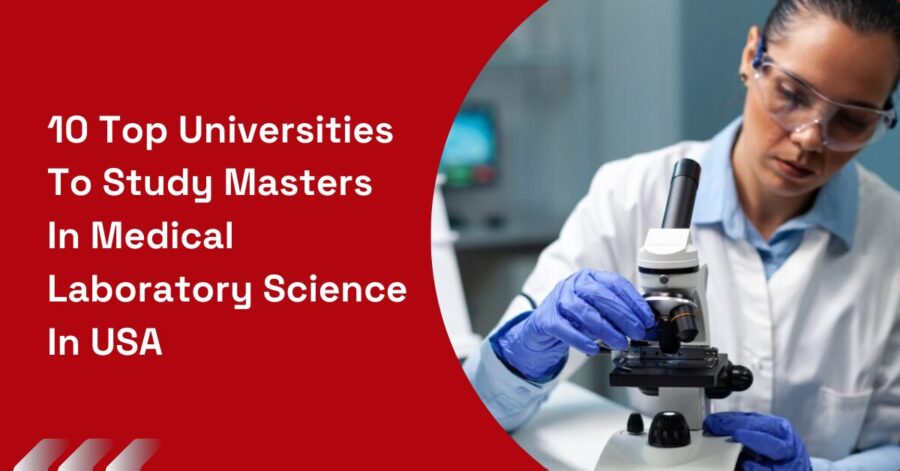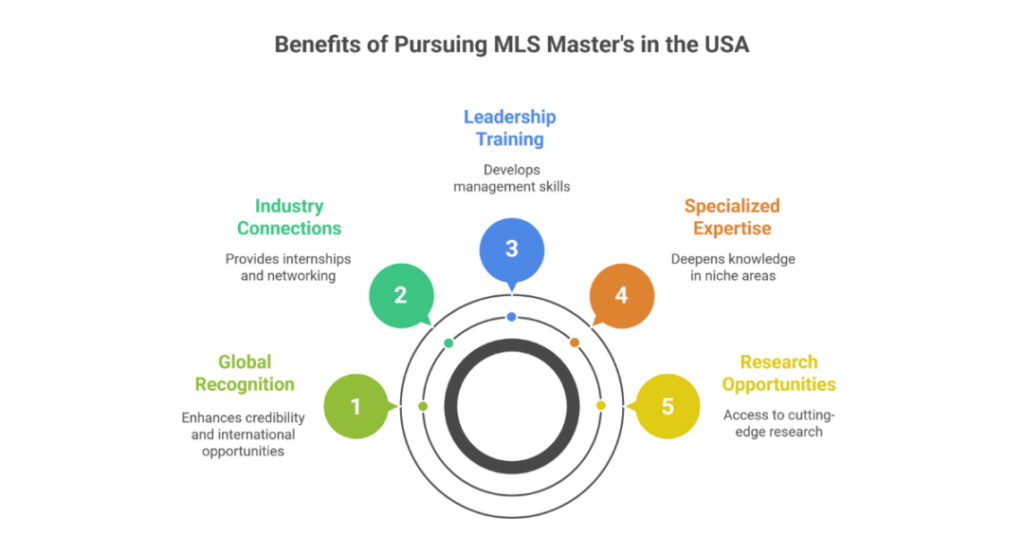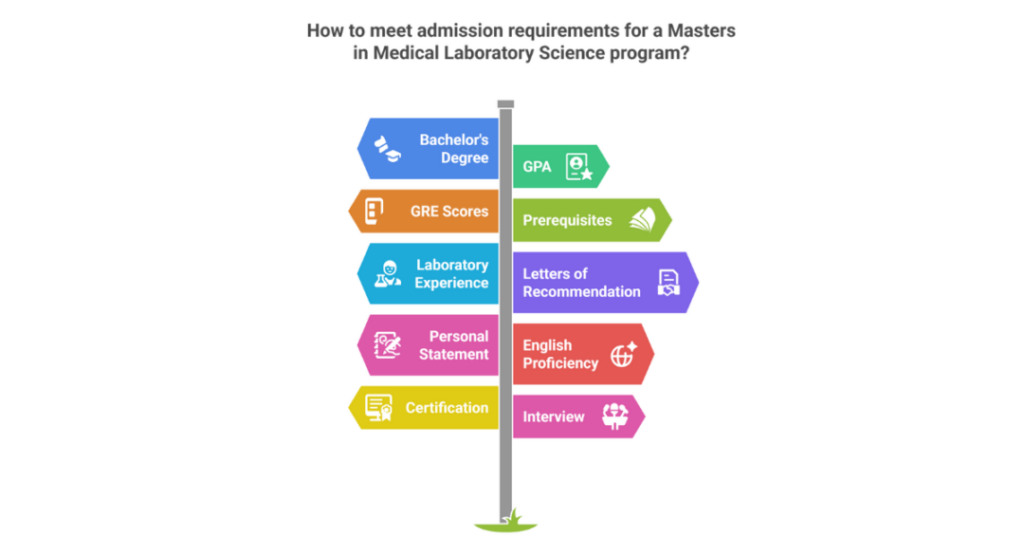5 August 2025
5 minutes read
10 Top Universities To Study Masters In Medical Laboratory Science In USA for Indian Students

Key Takeaways
- Masters in Medical Laboratory Science in USA offers strong career prospects, with 7% job growth and top programs blending research, diagnostics, and leadership.
- Leading universities like Johns Hopkins and Michigan offer high ROI, with average post-grad salaries ranging from $63,000 to $75,000+.
- Admission requires a science background, lab experience, and English proficiency—so prepare early to meet competitive program standards.
Did you know that the demand for medical laboratory scientists is projected to grow 7% from 2019 to 2029, faster than the average for all occupations? This surge in demand highlights the critical role of medical laboratory professionals in the healthcare system. As diagnostic testing becomes more complex and essential, the need for highly skilled MLS program graduates with advanced degrees continues to rise.
For many aspiring medical laboratory scientists, choosing the right master’s program can be hard. With numerous options available, students often struggle to find programs that offer the perfect blend of cutting-edge curriculum, hands-on clinical experience, and specialization opportunities. However, pursuing an advanced degree in medical laboratory science from a top-tier institution can significantly enhance your proficiency, open doors to leadership roles in laboratory management, and prepare you for national certification exams like the American Society for Clinical Pathology Board of Certification.
Why Pursue a Masters in Medical Laboratory Science in the USA?
There is a saying that the art of medicine consists in amusing the patient while nature cures the disease. But in today’s world, it’s the precision of medical laboratory science that often guides nature’s hand. A master’s degree in Medical Laboratory Science (MLS) from a top U.S. institution equips you with the skills to be at the forefront of this crucial field.

Here are a few reasons to pursue a Master in Medical Laboratory Science in the USA:
Cutting-edge Research Opportunities
U.S. institutions are at the vanguard of medical research. As an MLS master’s student, you’ll have access to state-of-the-art laboratories and the chance to contribute to groundbreaking studies in areas like molecular diagnostics and personalized medicine.
Specialized Expertise
Advanced courses in clinical chemistry, hematology, and immunology allow you to develop deep expertise in niche areas. This specialization can set you apart in the job market and open doors to roles in specialized medical laboratories.
Leadership and Management Training
Many MLS master’s programs incorporate courses on laboratory management, preparing you for leadership positions. You’ll learn about healthcare regulations, quality control, and team management – skills crucial for advancing your career.
Industry Connections
U.S. programs often have strong ties with hospitals, research institutions, and biotech companies. These connections can lead to valuable internships, clinical experiences, and networking opportunities that may jumpstart your career.
Global Recognition
A master’s degree from a reputable U.S. institution carries weight worldwide. It can enhance your credibility and open up international career opportunities, allowing you to make a global impact in the field of medical laboratory science.
10 Top Universities For Masters In MLS Program In USA
Did you know that medical laboratory scientists perform over 13 billion laboratory tests in the United States each year? These tests play a crucial role in nearly 70% of all medical decisions, from diagnosis to treatment plans. As the complexity and importance of laboratory testing continue to grow, so does the need for highly skilled professionals with advanced degrees. A Master’s in Medical Laboratory Science from a top U.S. university can provide you with the expertise and credentials to lead in this vital field.
Here are 10 accredited universities to study MLS in the USA with amazing elective courses like molecular biology, cell biology, biochemistry, and microbiology:
| University | QS Ranking | Average Fees (per year) | Average Salary (after graduation) |
|---|---|---|---|
| Johns Hopkins University | 3 | $58,000 | $75,000 |
| University of Michigan | 15 | $52,000 | $72,000 |
| University of Washington | 24 | $38,000 (in-state), $68,000 (out-of-state) | $70,000 |
| University of North Carolina at Chapel Hill | 32 | $35,000 (in-state), $70,000 (out-of-state) | $68,000 |
| Ohio State University | 101-150 | $36,000 (in-state), $56,000 (out-of-state) | $65,000 |
| University of Texas Medical Branch | 201-250 | $30,000 (in-state), $58,000 (out-of-state) | $67,000 |
| George Washington University | 251-300 | $64,000 | $71,000 |
| University of Vermont | 351-400 | $41,000 (in-state), $104,000 (out-of-state) | $66,000 |
| University of Massachusetts Lowell | 451-500 | $29,000 (in-state), $52,000 (out-of-state) | $64,000 |
| University of Rhode Island | 551-600 | $30,000 (in-state), $49,000 (out-of-state) | $63,000 |
What Are the Admission Requirements for a Masters in Medical Laboratory Science Program?
Many students struggle to meet the prerequisite coursework requirements, especially if their undergraduate degree wasn’t in a closely related field. Additionally, gaining relevant laboratory experience can be challenging, particularly for those transitioning from different career paths or recent graduates.
International students face additional hurdles, such as meeting English proficiency standards and navigating the complexities of visa applications. Moreover, securing strong letters of recommendation from professionals who can speak to one’s aptitude for laboratory science can be difficult for those with limited networking opportunities in the field.

To help clarify these requirements, here’s a table outlining typical admission criteria for MLS Masters programs in the USA:
| Requirement | Details |
|---|---|
| Bachelor’s Degree | Usually a bachelor of science in Medical Laboratory Science, Biology thesis, Chemistry, or a related field |
| GPA | Typically 3.0 or higher on a 4.0 scale |
| GRE Scores | Often required, though some programs may waive this |
| Prerequisites | Courses in Biology, Chemistry, Math, and Statistics |
| Laboratory Experience | Many programs prefer 1-2 years of clinical lab experience |
| Letters of Recommendation | Usually 2-3 academic letters of recommendation or professional references |
| Personal Statement | A strong personal statement, outlining career goals and interest in the field |
| English Proficiency | Advantages of TOEFL or IELTS scores for international students |
| Certification | Some programs may require MLS certification (e.g., ASCP) |
| Interview | Some programs conduct interviews for shortlisted candidates |
What Are the Career Options for Graduates with a Masters in Medical Laboratory Science?
A Masters in Medical Laboratory Science opens doors to a diverse array of career opportunities, extending far beyond traditional laboratory roles. Graduates find themselves equipped with advanced skills in diagnostic techniques, research methodologies, and laboratory management, allowing them to pursue positions that blend scientific expertise with leadership responsibilities.
Here’s a table outlining some of the career options available to graduates with a Masters in Medical Laboratory Science:
| Career Option | Description | Average Salary (USD) |
|---|---|---|
| Clinical Laboratory Director | Oversee lab operations and staff | $120,000 – $150,000 |
| Research Scientist | Conduct advanced research in medical labs | $70,000 – $100,000 |
| Molecular Diagnostics Specialist | Perform and interpret genetic tests | $75,000 – $95,000 |
| Healthcare Consultant | Advise on lab processes and technology | $80,000 – $130,000 |
| Biotechnology Project Manager | Lead research and development projects | $90,000 – $120,000 |
| Quality Assurance Manager | Ensure compliance with regulations | $80,000 – $110,000 |
| Clinical Trials Coordinator | Manage laboratory aspects of clinical trials | $70,000 – $100,000 |
| Medical Science Liaison | Bridge between scientific and business aspects | $100,000 – $150,000 |
| Academic Professor/Instructor | Teach and conduct research at universities | $60,000 – $120,000 |
| Forensic Laboratory Specialist | Apply MLS skills to criminal investigations | $60,000 – $90,000 |
Conclusion
While the journey isn’t easy—from meeting admission requirements to completing rigorous coursework—the payoff is substantial. You’re not just learning; you’re positioning yourself to make a real difference in patient care and medical research. Plus, the career flexibility is impressive. Whether you’re drawn to the precision of diagnostics, the excitement of research, or the challenges of leadership, there’s a path for you.
Remember, though, that success in this field goes beyond technical skills. The best MLS professionals combine scientific expertise with critical thinking, adaptability, and strong communication skills.
Begin your journey to studying in the USA, the land of diverse educational opportunities, with Ambitio. Our platform provides you with the tools and insights to navigate the vast landscape of American universities, helping you find the perfect institution that aligns with your academic goals and aspirations.
FAQs
What prerequisites are needed?
A related Bachelor’s degree, a minimum 3.0 GPA, GRE scores, recommendation letters, and clinical experience.
What courses are included in the program?
Advanced laboratory science, research methods, healthcare management, and clinical practicums.
Are there advancement opportunities?
Yes, particularly with experience and further specialization.
What are the career options post-graduation?
Roles include medical laboratory scientist, laboratory manager, research scientist, and quality assurance specialist.
Is the field financially rewarding?
Yes, with salaries ranging between $60,000 and $90,000 annually in the USA.

You can study at top universities worldwide!
Get expert tips and tricks to get into top universities with a free expert session.
Book Your Free 30-Minute Session Now! Book a call now




























